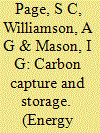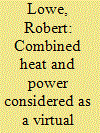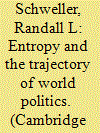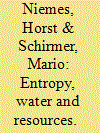|
|
|
Sort Order |
|
|
|
Items / Page
|
|
|
|
|
|
|
| Srl | Item |
| 1 |
ID:
090034


|
|
|
|
|
| Publication |
2009.
|
| Summary/Abstract |
Carbon capture and storage (CCS) is considered a leading technology for reducing CO2 emissions from fossil-fuelled electricity generation plants and could permit the continued use of coal and gas whilst meeting greenhouse gas targets. However considerable energy is required for the capture, compression, transport and storage steps involved. In this paper, energy penalty information in the literature is reviewed, and thermodynamically ideal and "real world" energy penalty values are calculated. For a sub-critical pulverized coal (PC) plant, the energy penalty values for 100% capture are 48.6% and 43.5% for liquefied CO2, and for CO2 compressed to 11 MPa, respectively. When assumptions for supercritical plants were incorporated, results were in broad agreement with published values arising from process modelling. However, we show that energy use in existing capture operations is considerably greater than indicated by most projections. Full CCS demonstration plants are now required to verify modelled energy penalty values. However, it appears unlikely that CCS will deliver significant CO2 reductions in a timely fashion. In addition, many uncertainties remain over the permanence of CO2 storage, either in geological formations, or beneath the ocean. We conclude that further investment in CCS should be seriously questioned by policy makers.
|
|
|
|
|
|
|
|
|
|
|
|
|
|
|
|
| 2 |
ID:
109437


|
|
|
|
|
| Publication |
2011.
|
| Summary/Abstract |
The first aim of this paper is to shed light on the thermodynamic reasons for the practical pursuit of low temperature operation by engineers involved in the design and the operation of combined heat and power (CHP) and district heating (DH) systems. The paper shows that the steam cycle of a combined heat and power generator is thermodynamically equivalent to a conventional steam cycle generator plus an additional virtual steam cycle heat pump. This apparently novel conceptualisation leads directly to (i) the observed sensitivity of coefficient of performance of CHP to supply and return temperatures in associated DH systems, and (ii) the conclusion that the performance of CHP will tend to be significantly higher than real heat pumps operating at similar temperatures. The second aim, which is pursued more qualitatively, is to show that the thermodynamic performance advantages of CHP are consistent with the goal of deep, long-term decarbonisation of industrialised economies. As an example, estimates are presented, which suggest that CHP based on combined-cycle gas turbines with carbon capture and storage has the potential to reduce the carbon intensity of delivered heat by a factor of ~30, compared with a base case of natural gas-fired condensing boilers.
|
|
|
|
|
|
|
|
|
|
|
|
|
|
|
|
| 3 |
ID:
094560


|
|
|
|
|
| Publication |
2010.
|
| Summary/Abstract |
The random and indeterminate nature of the current unipolar world suggests a condition of increasing entropy. There are two reasons for this claim. First, relative capability advantages under unipolarity do not translate as easily as they once did into power and influence over others. Second, systemic constraint is a property that limits actors' freedom of action by imposing costs and benefits on certain kinds of actions. Unlike past multipolar and bipolar systems, the current unipolar system exerts only weak, if any, systemic constraints on the unipolar power and all other actors as well. Thus, polarity has become a largely meaningless concept. Today, system process rather than structure best explains international politics, and this process is one of entropy. Finally, I suggest two pathways from unipolarity to a more balanced system: one is fairly consistent with standard balance-of-power realism but adds an ideational component; the other restores equilibrium by means of entropy.
|
|
|
|
|
|
|
|
|
|
|
|
|
|
|
|
| 4 |
ID:
108763


|
|
|
|
|
| Publication |
Heidelberg, Springer, 2010.
|
| Description |
ix, 219p.
|
| Standard Number |
9783790824155
|
|
|
|
|
|
|
|
|
|
|
|
Copies: C:1/I:0,R:0,Q:0
Circulation
| Accession# | Call# | Current Location | Status | Policy | Location |
| 056398 | 333.91/NIE 056398 | Main | On Shelf | General | |
|
|
|
|
|
|
|
|
|